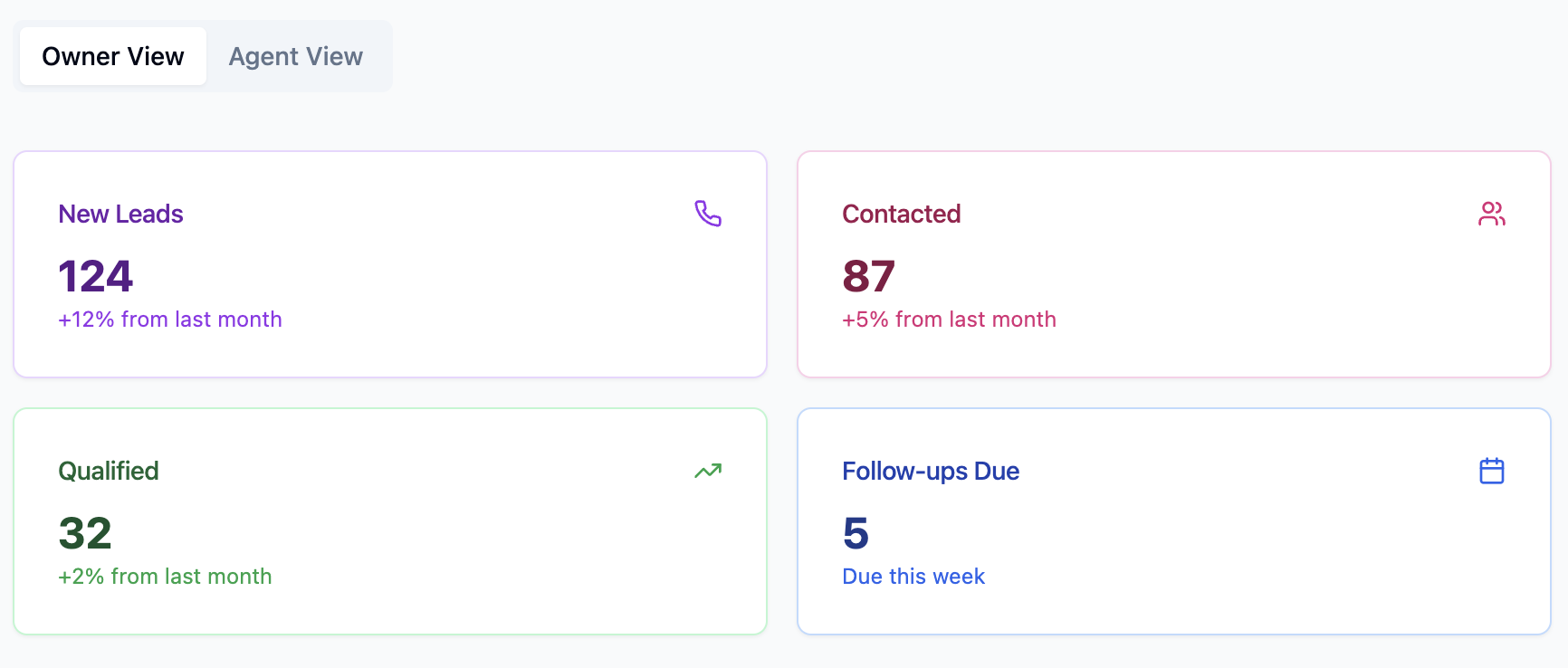CRM Meaning in Real Estate: Unlocking Growth and Efficiency with Intelligent Systems like Glue Sky

For professionals navigating the dynamic world of property transactions, understanding the CRM meaning in real estate is fundamental to building a thriving and sustainable business. CRM stands for Customer Relationship Management. In the context of real estate, it refers to the strategies, practices, and technologies that agents and agencies use to manage and analyze interactions and data throughout the client lifecycle. The goal is to improve business relationships, assist in client retention, and drive sales growth. While the concept is straightforward, the impact of a well-implemented CRM system, especially an AI-powered one like Glue Sky, can be transformative for real estate professionals.
This guide will break down the CRM meaning in real estate, explore its core components and benefits, and illustrate how modern, intelligent CRM systems are revolutionizing the way real estate business is conducted.
Defining CRM: What Does “Customer Relationship Management” Mean in the Real Estate Context?
At its heart, CRM meaning in real estate revolves around a simple principle: putting the client (and potential client) at the center of your business operations. It’s a holistic approach that encompasses:
- Technology: The software platforms and tools used to organize, automate, and synchronize sales, marketing, customer service, and technical support related to clients and leads.
- Strategy: A business philosophy focused on understanding and catering to client needs to build long-term, profitable relationships.
- Processes: The specific workflows and procedures implemented to manage interactions at every stage of the client journey, from initial lead capture to post-sale follow-up.
For a real estate agent or agency, a CRM system typically helps manage information and interactions related to:
- Leads: Potential buyers or sellers who have expressed interest.
- Prospects: Leads who have been qualified and are moving through the sales funnel.
- Clients: Individuals or entities you are actively representing in a transaction.
- Past Clients: Individuals you have previously helped buy or sell property, who are crucial for referrals and repeat business.
- Sphere of Influence (SOI): Your network of contacts (friends, family, acquaintances, past colleagues) who can be sources of referrals.
- Vendors and Partners: Other professionals involved in transactions (e.g., lenders, inspectors, attorneys).
Effectively, understanding the CRM meaning in real estate is about recognizing the value of a centralized system to manage all these vital relationships and the data associated with them.
Core Components & Functionalities of a Real Estate CRM System
A typical real estate CRM system will offer a range of functionalities designed to support the agent’s daily tasks and strategic goals. The “meaning” of a CRM is often defined by these capabilities:
-
Contact Management:
- Storing detailed profiles for every contact, including name, phone, email, address, communication history, property preferences, important dates (birthdays, anniversaries), and relationships to other contacts.
- Segmenting contacts into groups (e.g., buyers, sellers, hot leads, cold leads, past clients) for targeted communication.
-
Lead Management:
- Capturing leads from various sources (website forms, IDX/MLS inquiries, social media, real estate portals like Zillow, manual entry).
- Tracking lead status and progress through the sales pipeline.
- Distributing leads to agents (for team or brokerage CRMs like a top broker CRM).
- Tools for lead qualification and scoring. This is a key aspect of CRM lead management.
-
Task & Activity Management:
- Creating to-do lists, setting reminders for follow-up calls, emails, or appointments.
- Integrating with calendars to manage schedules effectively.
- Logging all activities related to a contact or deal.
-
Communication Tools & Tracking:
- Integrated email clients or syncing with existing email accounts.
- Templates for common emails to save time and ensure consistency.
- Capabilities for CRM with texting (SMS) and logging those interactions.
- Often, a CRM and dialer for efficient phone outreach, or even more advanced AI calling.
-
Sales Pipeline Management (Deal Tracking):
- Visualizing and managing deals through customizable stages (e.g., New Opportunity, Showing, Offer Made, Under Contract, Closed).
- Storing deal-specific information, including property details, financial terms, and important dates.
-
Marketing Automation (Often):
- Creating and managing CRM follow-up sequences or drip campaigns to nurture leads over time.
- Tools for sending out newsletters or property alerts.
-
Reporting & Analytics:
- Generating reports on lead sources, conversion rates, sales performance, agent activity, and pipeline health.
- Providing insights to help agents and brokers make data-driven decisions.
Understanding the CRM meaning in real estate means appreciating how these components work together to create a more efficient, organized, and client-focused business.
The Benefits: Why is a CRM So Important for Real Estate Professionals?
Implementing and effectively using a CRM system offers numerous benefits that underscore its true meaning and value in real estate:
- Improved Organization: All client and lead information is in one place, easily accessible and searchable.
- Enhanced Productivity: Automation of repetitive tasks and streamlined workflows save significant time.
- Consistent Follow-Up: Ensures no lead is forgotten and that prospects are nurtured systematically, increasing conversion rates.
- Better Client Relationships: Personalized communication and a clear understanding of client history lead to stronger, more trusting relationships.
- Increased Sales: By managing leads more effectively and nurturing them through the sales cycle, CRMs directly contribute to closing more deals.
- Data-Driven Insights: Analytics help identify what’s working and what’s not, allowing for continuous improvement of sales and marketing strategies.
- Scalability: A good CRM allows agents to manage a growing business without being overwhelmed.
- Professionalism: Demonstrates to clients that you are organized, attentive, and utilize modern tools to serve them effectively.
The true CRM meaning in real estate is realized when these benefits translate into tangible business growth and improved client satisfaction.
The Evolution of CRM Meaning: Introducing AI with Glue Sky
While traditional CRMs provide invaluable organizational tools, the meaning and capability of a CRM in real estate are being redefined by Artificial Intelligence. Glue Sky is at the forefront of this evolution, integrating AI to make its CRM not just a management tool, but a proactive engagement engine.
Here’s how Glue Sky expands the CRM meaning in real estate:
-
CRM as an AI Engagement Partner: Glue Sky’s AI doesn’t just help you *remember* to follow up; it can *perform* the initial follow-up for you.
- AI Cold Calling: The AI voice assistant can instantly call new leads, engage them in natural conversation, ask qualifying questions, and even book appointments. This adds a layer of proactive outreach that traditional CRMs lack.
- AI-Generated Emails & SMS: The AI assists in crafting personalized, context-aware emails and text messages that are automatically sent as part of intelligent follow-up sequences.
- CRM as an Automation Powerhouse: Glue Sky’s “smart sequences” automate complex, multi-channel outreach workflows (combining AI calls, emails, and texts) that adapt to lead behavior. This means your CRM is actively working your leads 24/7.
- CRM as an Efficiency Multiplier for Real Estate Agents: By automating the most time-consuming aspects of lead engagement and qualification, Glue Sky allows agents to focus their expertise on high-intent, pre-vetted prospects. It’s like having a built-in real estate AI assistant.
With Glue Sky, the CRM meaning in real estate expands from “managing relationships” to “intelligently and automatically initiating and nurturing relationships at scale.” This is a critical distinction in today’s competitive market, transforming the CRM from a passive database into an active AI sales agent.

Who Benefits from Understanding and Implementing a Real Estate CRM?
Effectively understanding and utilizing a CRM benefits all levels of real estate professionals:
- Individual Agents (Single Real Estate Agents): Gain organization, automate follow-up, and manage a larger pipeline than would be manually possible, effectively acting like a larger operation.
- Real Estate Teams: Facilitate collaboration, ensure consistent lead handling, distribute leads effectively, and track team performance.
- Brokerages: Implement standardized processes, monitor agent productivity, improve brand consistency, and gain high-level insights into agency performance.
The CRM meaning in real estate, therefore, is about empowerment and growth across the board.
Conclusion: The Evolving Meaning of CRM in Real Estate is Powered by Intelligence
In conclusion, the CRM meaning in real estate extends far beyond a simple digital address book. It represents a strategic approach and a technological toolkit for systematically managing and enhancing every client and lead relationship to drive business growth. A robust CRM system provides organization, efficiency, and the ability to deliver personalized service at scale.
Platforms like Glue Sky are pushing the boundaries of this meaning by integrating powerful AI and automation capabilities. This transforms the CRM from a reactive tool into a proactive partner that actively engages leads, qualifies prospects, and automates complex follow-up sequences. For real estate professionals looking to not just keep up but to lead in today’s market, embracing an intelligent, AI-powered CRM like Glue Sky is key to unlocking new levels of success and efficiency.
Understanding the true CRM meaning in real estate is the first step; leveraging a platform that embodies its full potential is the next.
Ready to experience the transformative power of an AI-driven CRM and redefine what lead management means for your real estate business? Explore Glue Sky’s platform today and request a personalized demo.
Dive Deeper into Real Estate CRM Capabilities:
- Real Estate CRM System: Automate & Grow with Glue Sky’s AI
- CRM Software Real Estate: Power Your Agency with Glue Sky’s AI
- Best Real Estate CRM: AI-Powered Lead Conversion with Glue Sky
- CRM Realtors: Your Secret Weapon for Real Estate Success
- Top CRM for Real Estate: Glue Sky’s AI-Powered Advantage
- Real Estate Customer Relationship Management: Building Lifelong Clients
- Real Estate Client Management Software
- How Real Estate Agents Can Use AI: A Guide to Smarter Operations
- What CRM Does eXp Realty Use (and How Glue Sky Complements It)
- Constant Contact Lead Gen & CRM vs. Glue Sky’s AI Solution
